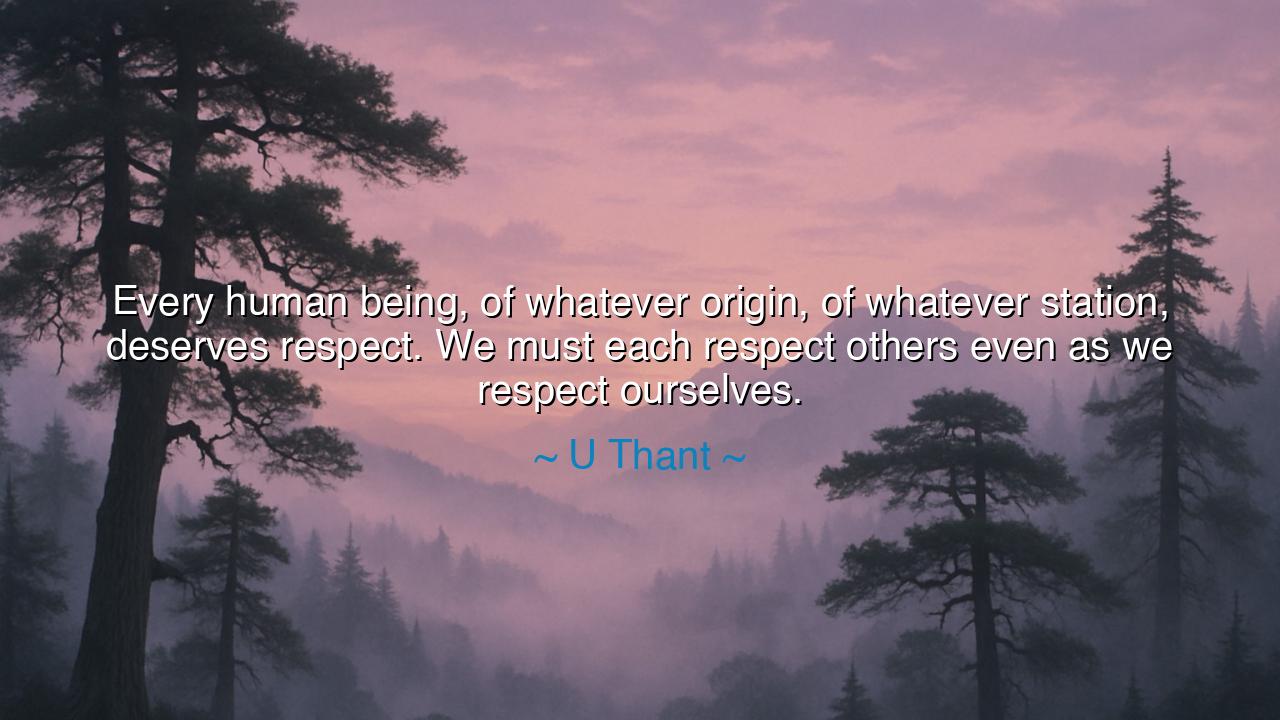
Every human being, of whatever origin, of whatever station
Every human being, of whatever origin, of whatever station, deserves respect. We must each respect others even as we respect ourselves.






"Every human being, of whatever origin, of whatever station, deserves respect. We must each respect others even as we respect ourselves," said U Thant, a man who understood deeply the universal truth that binds all of humanity together. In these words lies an ancient and eternal wisdom: the concept that every human being, regardless of their background, status, or wealth, is worthy of respect. To truly live a life of dignity, one must not only honor oneself but extend that honor to others, recognizing in them the same inherent worth that we recognize in ourselves. This is the wisdom passed down through millennia, from the ancient sages to the philosophers of the modern era.
In the ancient Chinese wisdom of Confucius, we find a similar sentiment. Confucius taught that the key to a harmonious society is the mutual respect of all people, regardless of their place in the social hierarchy. In his teachings, the respect shown to others is not an optional virtue but a moral duty—a foundation upon which a just and peaceful society is built. For Confucius, the respect for others was the very essence of being human, a quality that should be practiced both in public and private life. He famously said, “Do not do unto others what you do not want done to yourself,” echoing the sentiment that true respect arises from the recognition that all people share the same humanity, and thus deserve to be treated with dignity.
Likewise, in the ancient Roman tradition, Seneca, the Stoic philosopher, emphasized that our treatment of others is a reflection of our own character. He wrote, “Wherever there is a human being, there is an opportunity for a kindness.” For Seneca, the true strength of an individual lies not in their ability to dominate others, but in their ability to treat everyone—rich or poor, slave or free—with the same respect and compassion that they would wish for themselves. This wisdom speaks to the deep interconnectedness of all human beings, where our actions towards others are a measure of our own integrity.
In the realm of history, we see countless examples of individuals who, in their wisdom, recognized the power of respecting others. One such individual is the Mahatma Gandhi, whose life was dedicated to the principles of non-violence and respect for all people. Gandhi's belief that every person, regardless of their race, religion, or social standing, deserved respect was at the heart of his movement for Indian independence. He famously said, “An eye for an eye only ends up making the whole world blind.” In this, he recognized that true freedom comes not from fighting against others but from embracing them, from recognizing their humanity as equal to our own.
The lesson in U Thant's words is that respect is not a mere act of politeness, but a fundamental truth that should guide all our interactions. It is easy to respect those who are like us, who share our views, our background, or our social status. But true wisdom comes in respecting those who are different, who may come from distant lands, hold different beliefs, or occupy different stations in life. To treat others with respect is to see beyond the surface, to understand that beneath the differences lies the same human essence that binds us all.
In our own time, we can take these teachings to heart by considering how we treat those we encounter in our lives. Respect is not just for the powerful or the influential, but for the humble, the poor, and the forgotten. It is in our everyday actions, in the way we speak to others, in the way we listen and serve, that we either affirm or deny the human dignity of those around us. To respect others is to honor their right to be who they are, to be seen as they are, and to be treated with the kindness and compassion we would wish for ourselves.
So, let us live by this ancient wisdom: to respect others, regardless of their origin, their station, or their condition, is to honor the very sacredness of human life. It is in this respect that we build a society that is not divided by the distinctions of wealth or power, but united by the recognition of our shared humanity. Let this truth guide our actions: to respect others is to respect ourselves, for in honoring them, we honor the best within us all.






AAdministratorAdministrator
Welcome, honored guests. Please leave a comment, we will respond soon